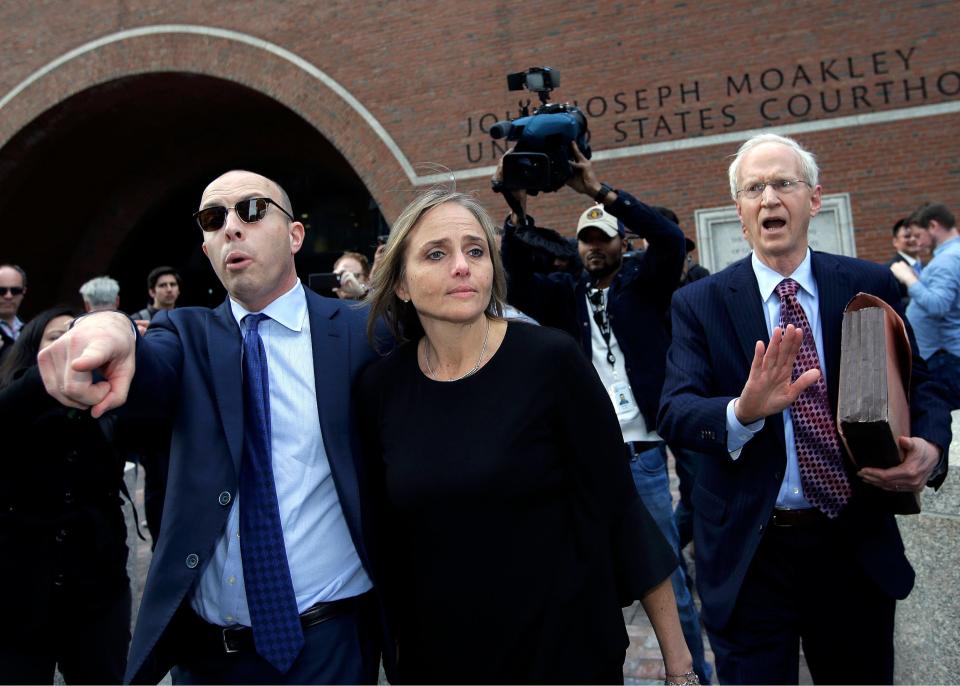Massachusetts judge allowed to keep $181K salary amid federal charges for obstructing ICE
BOSTON – In a reversal, a Massachusetts judge indicted for allowing an undocumented immigrant to evade ICE by slipping out the backdoor of a courthouse will be able to keep her $181,328 annual salary and get back pay during her ongoing suspension.
The Massachusetts Supreme Judicial Court, in a 5-1 decision Tuesday, ruled to reinstate the salary and benefits of District Judge Shelley Joseph and to pay her compensation that was withheld since April 25, when federal obstruction charges were filed against her. Joseph has pleaded not guilty.
The court had initially suspended Joseph without pay, pointing to procedures for trial courts in Massachusetts for employees who is indicted for misconduct while in office. But in the new order, a majority of justices agreed that "suspension with pay is more appropriate under these circumstances."
The court did not reach a full consensus, however. One justice, Frank Gaziano, in a stinging dissenting opinion, said the decision to reverse court "smacks of preferential treatment, and thereby erodes public confidence in the judiciary."

"A few months ago, when we suspended her, we recognized that the suspension
without pay would have serious financial consequences for the judge, but that we had no other option if we were to maintain public confidence in the judiciary. Nothing has changed."
More: Judge indicted for helping undocumented immigrant evade ICE wants pay during suspension
Joseph, a state judge in Newton, outside Boston, was indicted April 25 by the Justice Department for allegedly preventing federal immigration agents last year from arresting an undocumented immigrant. A court officer, Wesley MacGregor, was also charged. He's pleaded not guilty as well.
Prosecutors say that Joseph and MacGregor allowed Jose Medina-Perez, a Dominican national detained on drug and outstanding warrant charges, to leave the courthouse from a downstairs back door after the judge instructed an immigration agent to wait in the hallway outside her courtroom. Medina-Perez has been deported twice before in 2007 and 2003 and had been barred from reentering the country until 2027.
The high-profile indictment of Joseph came amid a standoff between President Donald Trump, who has overseen a strict enforcement of immigrant policy, and U.S. communities that have objected to providing the federal government information on residents' immigration status.
The five Supreme Court justices in the majority, including Chief Justice Ralph Gants, wrote their reasons in two separate concurrences. They noted that in previous instances when Massachusetts judges had been suspended without pay it came after investigations from the Commission on Judicial Conduct. But such an investigation has not concluded with Joseph's matter.
They also acknowledged the court is "left with two poor alternatives" – either use public funds to pay a judge who is not working or create a financial burden for the judge that hurts her ability to return to the bench.
But the justices wrote that suspending Joseph without pay "may do more than burden an individual judge" by making it difficult to put up a legal defense and therefore hurting the power of the courts.
"In turbulent times, the risk of being stripped of a paycheck may have a chilling effect on a judge's willingness to challenge the conduct of a prosecutor and thereby diminish the overall independence of the judiciary ... " the order reads.
The justices also questioned taking away Joseph's pay for an indictment, which is based only on probable cause, as opposed to a guilty verdict that has a higher bar.
In addition they said the "practical consequence" of a suspension without pay is "more severe" with a judge who is inhibited from making money in other ways during a suspension than other court employees.
Judge charged: Feds charge Mass. judge with obstruction for aiding undocumented immigrant's escape from ICE
The Justice Department's case against Joseph is being tried separately in Boston federal court. The next pre-trial hearing is set for Sept. 10.
Joseph appealed her initial suspension without pay in May, calling it "without precedent" to impose the penalty before the court or another administrative body has determined a wrongful act. Her attorneys argued that the suspended pay presented a "financial dilemma," forcing Joseph to borrow "significant sums of money from family and friends to meet her expenses."
"She may soon be forced to choose between keeping her family home and mounting a robust defense to the criminal indictment," they said.
Although the Supreme Court sided with Joseph on the salary question, the justices unanimously rejected her request that she be reassigned to administrative duties during the suspension.
The U.S. Attorney in Boston prosecuting the obstruction case against Joseph, Andrew Lelling, a Trump appointee, has said the case is "about the rule of law," not immigration. Joseph's defense team has objected, calling the indictment "absolutely political."
Reach Joey Garrison on Twitter @joeygarrison.
This article originally appeared on USA TODAY: ICE obstruction case: Judge allowed to keep salary amid federal charges

